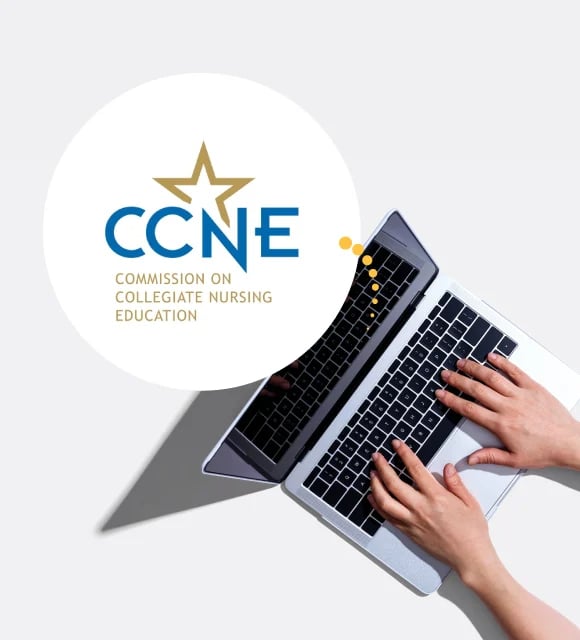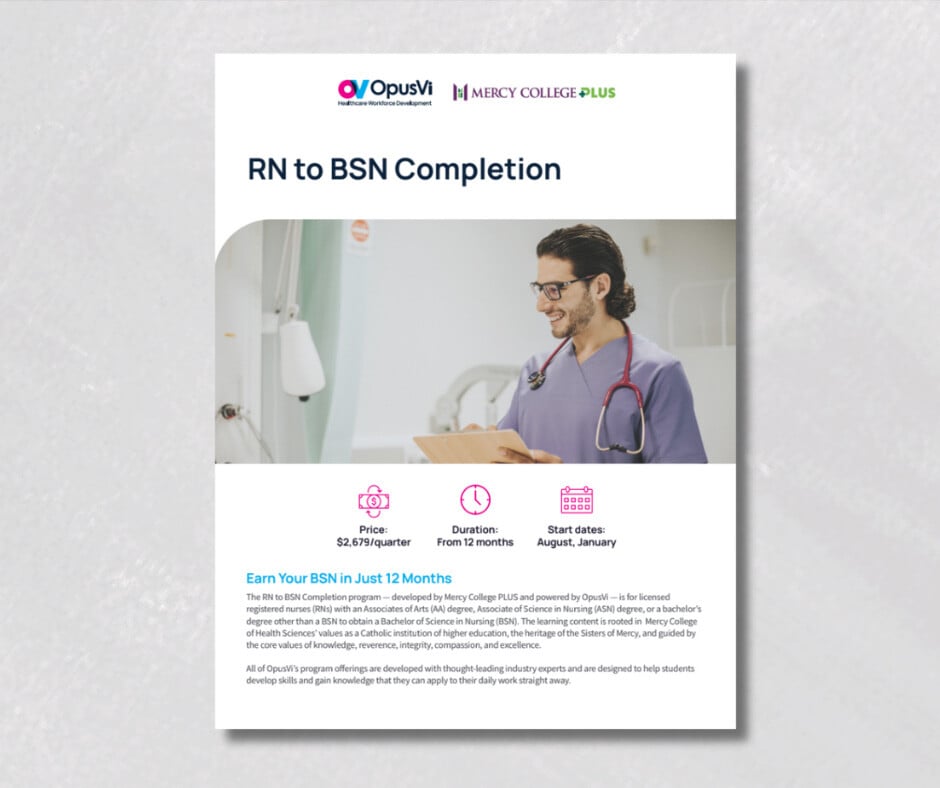Our curriculum was designed in coordination with nursing leaders in healthcare innovation and delivery. We have combined competencies as outlined by the American Organization of Nurse Executives' Nurse Executive Competencies, the American Association of Colleges of Nursing's BSN Essentials for Professional Nursing Practice, and the Quality and Safety Education for Nurses (QSEN). This thoughtful integration ensures that when you graduate, you will be prepared to assume roles in leadership, education, research, and community health.
Duration:
Min Cohort:
Partner:
Relevant
curriculum developed with hospital-based nurse leaders.
Engaging
high-quality learning experience
Affordable
tuition: only $10,716
100%
and flexible — designed to work with your schedule

Earn Your BSN in Just 12 Months
The RN to BSN Completion program — developed by Mercy College PLUS and powered by OpusVi™ — is for licensed registered nurses (RNs) with an Associates of Arts (AA) degree, Associate of Science in Nursing (ASN) degree, or a bachelor’s degree other than a BSN to obtain a Bachelor of Science in Nursing (BSN). The learning content is rooted in Mercy College of Health Sciences’ values as a Catholic institution of higher education, the heritage of the Sisters of Mercy, and guided by the core values of knowledge, reverence, integrity, compassion, and excellence.
Flexible Format
The 100% online format and engaging learning platform allow working professionals to gain qualifications on their own schedule.
Affordable, Online and Made For You
Excellent education leads to great healthcare. That’s why healthcare professionals should never have to choose between affordability and high quality when it comes to their education. MercyPLUS and OpusVi™ have worked together to make a high-quality program specifically designed for nurse leaders accessible — not only by offering it online, but also by making it extremely affordable. The tuition cost for this program is only $2,679 per quarter — and if your employer offers tuition reimbursement, your out-of-pocket cost might be even lower.
Program Highlights
High-Quality Content
Never a passive learning experience with engaging video and interactive content
Learning Science
Community-Driven

What You Will Earn
- A Bachelor of Science in Nursing (BSN) awarded by Mercy College of Health Sciences (institutional accreditation is granted by the Higher Learning Commission (HLC))
- The program is accredited by the Commission on Collegiate Nursing Education (CCNE); 655 K Street, NW, Suite 750; Washington, DC 20001; Phone: (202) 887-6791
- Your Mercy College of Health Sciences education is approved by the Iowa Board of Nursing (IBON); 400 SW 8th St, Suite B; Des Moines, IA 50309; Phone: (515) 281-3255.
Frequently Asked Questions
Curriculum
The following courses are required to graduate from the RN to BSN major. Additional coursework may be required depending on your individual situation. The suggested course sequence allows you to earn your Bachelor of Science in Nursing in 12 months through part-time enrollment for only $10,716.
- Quarter 1
- NSG 404: Program Orientation and Professional Writing (1 credit)
- NSG 413: Holistic Nursing (3 credits)
- NSG 416: Information and Financial Management in Nursing (3 credits)
- Quarter 2
- NSG 418: Research and Evidence-Based Practice (3 credits)
- NSG 425: Advocacy and Health Policy (3 credits)
- Quarter 3
- NSG 426: Genomics, Aging, and End-of-Life Care (3 credits)
- NSG 481: Community Health Nursing (4 credits)
- Quarter 4
- NSG 483: Theories of Leadership and Management (3 credits)
- NSG 485: BSN Professional Nursing Practice (3 credits)
Total: 26 major credits
Entry Requirements
**Mercy College is currently not able to accept students from the states of Washington and California for this specific degree program.**
We've worked hard to make the application process as easy as possible for you. All applicants need to do is complete the following two-step application process.
- Step one: Apply to Mercy College of Health Sciences.
- The application is free of charge.
- Applicants must have a cumulative GPA of 2.25 from the college where their last 9 credits were earned.
- You must submit all official transcripts.
- All grades must be a 'C' or higher.
- Step two: Admission to the program is determined.
- Applicants must have an active RN license.
- Applicants must meet the core requirements for all courses except for Servant Leadership, Nutrition, and Statistics.
- If you have an Associates of Arts (AA) degree, an Associate of Science in Nursing (ASN) degree, or a bachelor’s degree other than a BSN, it’s likely that you will meet the core requirements.
- If you have an Associate of Applied Science (AAS) or a diploma, you can still apply but it’s likely that you will need to take an additional one to six credits in order to be admitted into the RN to BSN program.
Learning Outcomes
Our RN to BSN Completion program:
- Encourages students to think about current healthcare needs such as population health
- Provides students with skills such as critical thinking that are desirable in the workforce by implementing exercises that utilize such skills into the curriculum
- Gives students a worldly perspective so they can better interact with the world
- Helps students answer important questions about leading in a world that’s changing tremendously and other topics
- Use case scenarios to analyze and critique processes to identify areas of improvement
Tuition and Additional Costs
OpusVi™ and MercyPLUS stand for transparent pricing with no surprise tuition or hidden fees — you pay a fixed price of $2,679 per quarter, which allows you to take up to 12 credits. On top of a top-accredited education, you also have access to a suite of student support services, including enrollment coaches, personal research coaches, as well as academic and personal counseling.

Download our brochure.
The average manager spends 15 days chasing paperwork each year.
The traditional method for tracking & managing competencies doesn’t just lead to the big paper chase, it can result in unnecessary errors. Errors that will be caught on survey day. Errors that may be the difference between life and death.
It’s time to get One Step Ahead with our digital competency management program.


An organization of 50 employees can save 1,500 sq ft of storage space.*
*According to US Averages
Just imagine what your space can become if it’s not taken up by an endless sea of binders.

About Mercy College Plus
Mercy College PLUS provides degrees that are accredited, affordable, flexible, and in-demand. Since 1899, Mercy College of Health Sciences has been empowering students with the training, knowledge, and education to become successful healthcare professionals.
Mercy College PLUS continues this legacy by expanding online education designed in collaboration with industry experts. With multiple starts per year, affordable tuition, and generous transfer credit acceptance, students can advance their healthcare careers in a manner and time that is ideal and convenient for them.
Student FAQs
What is the time commitment?
- Courses: Online, 7.5-week sessions
- Semester Starts: Fall only for new cohorts
- Part-time status: = 6 hours per semester (3 credits in summer) and would take 8 semesters to complete. The program is designed for part-time enrollment.
- Timeline: Students have 6 years from the start of the first class to complete the program.
Expected study time: 3-4 hours per week, per credit hour.
Why Field Education?
“As professionals in the making, social work students attend class to learn practice principles, values and ethical behaviors, a body of specialized knowledge, and the scientific basis for practice. In field placement, students apply, under supervision, what they have been learning in the classroom to real situations. Thus, the preparation to become a social work professional is composed of formal learning as well as practical experiences”.
Royse, D., Dhooper, S., Rompf E. (2012). Field Instruction. A Guide or Social Work Students, Long Grove, IL: Waveland Press.
Where can I find more information about new MSW Field Education Placements?
A full list of Frequently Asked Questions for New MSW Field Education Placement Sites is available for download.
How many field hours are required?
The Two-Year Program requires a minimum of 900 clock hours at two different placement sites.
The Advanced Standing (Specialized Year) requires a minimum of 450 clock hours in one placement. Specialized Year field placements must be in a different organization than the BSW year and Foundation Year.
• Foundation Year: 450 hours; 225 a semester (15 a week)
• Specialized Year: 450 hours; 225 a semester (15 a week)
*If your internship class is over a summer semester, you will be required to attend internship for at least 19 hours a week during the 12-week summer semester*
What is expected of a Field Supervisor?
The Field Supervisor will serve as a mentor and instructor for a student. They will provide one hour of supervision per week. The Field Supervisor is responsible for assisting the student in developing their learning contract, monitoring the student’s progress, completing both a mid-term and final evaluation, and providing professional mentoring.
What are the Field Supervisor's Qualifications?
The Field Supervisor must be an MSW with at least two years post-graduate experience. NAU and the Council on Social Work Education (CSWE), our national accrediting body, does not require Field Supervisors to be in a leadership role within the agency to qualify.
Let’s discuss your unique needs and how OpusVi can empower and elevate your healthcare workforce.
Learn how our workforce development solutions improve retention and elevate the healthcare industry.

